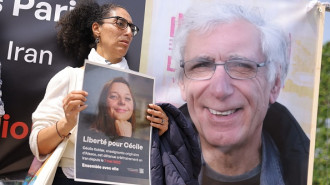Egyptian police tortured detained children, says Human Rights Watch
Human Rights Watch accused Egyptian police on Thursday of detaining and torturing 20 people, including eight children, saying there was a pattern of abuse in the North African country.
The New York-based group said in a report that six people arrested in the coastal city of Alexandria in February had reported to relatives that they were tortured with electric shocks and beatings.
They had been accused of protesting without a permit, vandalism and arson, and joining an illegal group.
HRW said that police had initially refused to admit they were holding the detainees for more than a week.
When the detainees appeared in court a week later, police said in a report to the prosecutor they had just been arrested.
"Some Egyptian officials have disappeared children and apparently tortured them, then faked arrest records to cover it up," the report quoted HRW's children's rights director Zama Coursen-Neff as saying.
"The authorities have turned a blind eye to the reports of abuse and refused to investigate."
 |
Rights groups say Egyptian security services have carried out abuses against protesters and dissidents that spiked after the military overthrew Islamist president Mohamed Morsi in 2013. |  |
The report said six of the detainees told relatives they were suspended by their arms, electrocuted in the genitals and punched.
They had been arrested after an alleged arson attack on a police vehicle and a garage.
"The arrests fit a wider pattern of abuse and violations by officers of the Interior Ministry's National Security Agency," the report said.
"Since 2014, Human Rights Watch has documented National Security officers' frequent use of enforced disappearance and torture, as well as a failure by prosecutors and judges to investigate these violations when defense lawyers raise them."
An Egyptian police official told AFP that the allegation in the report "was illogical and clearly fabricated."
Rights groups say Egyptian security services have carried out abuses against protesters and dissidents that spiked after the military overthrew Islamist president Mohamed Morsi in 2013.
His overthrow unleashed a deadly police crackdown on his supporters which left more than 1,000 protesters dead and thousands in prison.
Morsi's Muslim Brotherhood movement has been blacklisted as a terrorist group, and protests without a police permit are banned.





 Follow the Middle East's top stories in English at The New Arab on Google News
Follow the Middle East's top stories in English at The New Arab on Google News

![The law could be enforced against teachers without prior notice [Getty]](/sites/default/files/styles/image_330x185/public/2178740715.jpeg?h=a5f2f23a&itok=xMdFOAIF)
